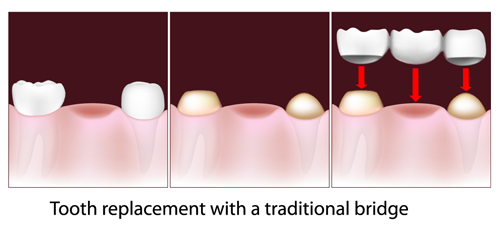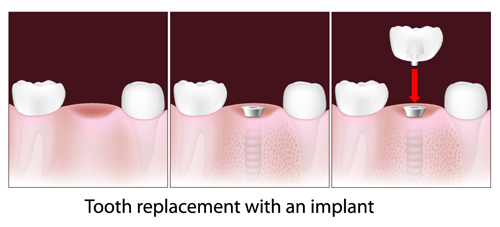Services > Implants > Options to Replace Missing Teeth
It can be challenging to decide what to do, after losing a tooth. Fortunately, there are several options available.
The first decision, and easiest, is to leave an empty space where the tooth was removed. While this may be the least expensive option, it can result in unsightly gaps and spaces between teeth, and can also make chewing more difficult. In addition, adjacent or opposing teeth may sometimes drift into the empty space, causing bite or gum problems.
If, like most people, you decide to replace the missing tooth, the following options may be available to you.
| Partial or Complete DenturesDentures are false removable teeth that are relatively quick and easy to fabricate. They can be partial, where only one or a few teeth are replaced, or complete, where all the teeth are missing in the jaw and are replaced. A partial denture holds false teeth on a plastic or metal framework. The framework is removable, and is designed to fit around the adjacent teeth. It may cover part of the gum tissue or roof of mouth. There may also be hooks and rests to help hold the framework in; these can sometimes be visible when smiling. Dentures should be removed nightly for cleaning, and to allow the gum tissue to “breathe”. |
A bridge uses natural teeth adjacent to the empty space, to support a false tooth/teeth between them. The natural teeth need to be shaved or contoured, so that a crown (cap) can be placed over top.
Bridges are excellent solutions if the adjacent teeth already require crowns for unrelated reasons (eg large fillings that are at risk of fracture).

Dental implants can also replace natural teeth. Implants are usually composed of two major parts: the implant, which acts as an anchor in the jaw; and the crown, which is the tooth part visible in the mouth. Implants are excellent options as they do not affect adjacent teeth, yet look, feel, and function just as natural teeth do.

When looking at the advantages of dental implants, it is helpful to compare them against other the above options to replace missing teeth.
Many patients prefer implants over partial dentures as implants are fixed in place and are not removed nightly. Implants can also be more esthetic, as they do not have hooks or clasps that can be visible when smiling.
In situations where the natural teeth (abutments) are completely healthy, shaving or reducing them to prepare for a bridge “damages” them unnecessarily. Furthermore, should any of the natural teeth beneath a crown be lost for any reason (eg decay or gum disease), the entire bridge is usually lost as well. In contrast, implants do not affect the adjacent abutments; they are placed only in the positions where teeth are missing, and do not rely upon the adjacent teeth.